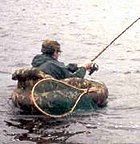Ama (diving)

Ama (海人, women 海女; men 海士;), uminchu (in Okinawan) or kaito (in Izu Peninsula) are Japanese divers, famous for collecting pearls. The majority of ama are women.
History
Japanese tradition holds that the practice of ama may be 2,000 years old.[1] Traditionally, and even as recently as the 1960s, ama dove wearing only a loincloth. Even in modern times, ama dive without scuba gear or air tanks, making them a traditional sort of free-diver.
Activities
Depending on the region, ama may dive with masks, fins, and torso-covering wetsuits at the most. Only divers who work for tourist attractions use white, partially transparent suits.
Ama are famous for pearl diving, but originally they dove for food like seaweed, shellfish, lobsters, octopus, and sea urchins — and oysters which sometimes have pearls.
Ama can keep diving well into old age. The older divers are generally able to stay submerged longer than the younger.[citation needed] Usually they also have another job, typically working on a farm. The Japanese believe that the majority of ama are women because of how their bodies differ from men: The fat on a female body is distributed differently than on men, which ensures that they can stay warmer in colder water.
In pop culture
In the Ian Fleming James Bond series, Bond travels to Japan in the novel You Only Live Twice. He meets and becomes involved with ama Kissy Suzuki. The character was also portrayed in the film version.
See also
Notes
- ^ Rahn, H. (1965). Physiology of Breath-Hold Diving and the Ama of Japan. United States: National Academy of Sciences - National Research Council. p. 369. ISBN 0-309-01341-0. Retrieved 2008-04-25.
{{cite book}}: Unknown parameter|coauthors=ignored (|author=suggested) (help)
References
- Martinez, D P (2004) Identity and Ritual in a Japanese Village University of Hawaii Press. ISBN 978-0-8248-2817-2
- Mishimo, Yukio (1994) The Sound of Waves. Vintage. ISBN 978-0-679-75268-4
- Yoshiyuki Iwase (Photographer, 1904–2001)


